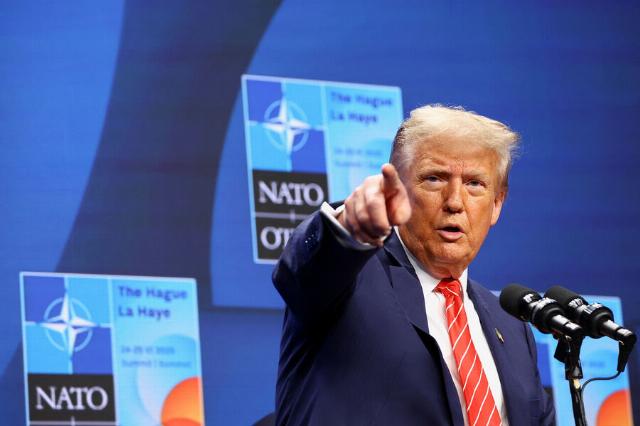Colonel Khodarenok: NATO countries competed in kowtowing to Trump
The next NATO summit, which took place from 24 to 25 June, ended in The Hague. It was attended by delegations from 32 Member States. In the final declaration of the summit, Russia was called a "long-term threat," and Ukraine was once again not promised membership. What were the main threats to NATO named at the summit, what will happen with Kiev's support, and how the presence of Donald Trump affected the atmosphere of the event, says the military observer of Gazeta.Ru", retired Colonel Mikhail Khodarenok.
As stated in The Hague, the NATO allies met in the Netherlands to make decisions that "will make NATO an even stronger, fairer and deadlier alliance. We live in a more dangerous world, and this is a critical moment for our safety."
At the summit, we discussed a number of issues facing the Alliance: we focused on deterrence and defense. The participants assured that NATO has the resources, forces and capabilities to counter any threat.
The main threats to NATO
The summit ended with the adoption of the final declaration, which includes the following points:
- All Member States agree on a new defense spending target of 5% of GDP (it was 2%);
- The NATO member states confirm their unwavering commitment to Article 5 of the Washington Treaty;
- The North Atlantic Alliance is committed to continuing to support Ukraine: "The Allies confirm their continued sovereign commitments to support Ukraine, whose security contributes to our security, and to this end will make direct contributions to the defense of Ukraine and its defense industry when calculating Allied defense spending."
As for Article 5 of the NATO Charter, the final declaration reads as follows: "We, the heads of State and Government of the countries of the Alliance, have gathered in The Hague to reaffirm our commitment to the strongest alliance in history, NATO, as well as transatlantic ties. We reaffirm our unbreakable commitment to collective defense, as enshrined in article 5 of the Washington Treaty, which states that an attack on one is an attack on all. We remain united and determined to protect our billion citizens, defend the Alliance, and defend our freedom and democracy."
By and large, there is no special novelty in this statement. Back in 2022, a new NATO Strategic Concept was published in Madrid. This document defines Russia as "the most significant and direct threat to the security of NATO members," and for the first time examines China and the security challenges posed by Beijing to the interests and values of NATO members.
Tellingly, the final declaration of the alliance does not contain any harsh language regarding its own and Russia as a whole, which were noted in the documents of the previous NATO summit.
Assistance to Ukraine
At a press conference during the summit, the US president was asked about possible supplies of Patriot anti-aircraft missile systems to Ukraine. Donald Trump has not said anything specific about this, avoiding specific formulations.
Most likely, there will be no deliveries or sales of Patriot air defense systems, much less the transfer of anti-aircraft guided missiles to Kiev in the near future. And, most likely, this will be due to the need to strengthen the combat capabilities of Israel's air/missile defense.
The conflict between Israel and Iran has shown that Jerusalem, in principle, has a fully operational missile defense/air defense system. At the same time, during the fighting, the territory of the Jewish state was subjected to such intense attacks by Iran's operational and tactical ballistic missiles, which was hardly expected before the war.
There is no doubt that in the near future the Israeli authorities will take all possible measures to strengthen missile defense/Air defense of the state. And this will require the supply of the Israel Defense Forces and new anti-aircraft missile systems, and a sharp increase in the number of missiles/anti-missiles at launch sites.
As for the commitments of the North Atlantic Alliance to support Ukraine and direct contributions to its defense and defense industry, the question, as usual, is about volume and timing. Kiev is not confident that the volume of these supplies will increase dramatically in the near future. As is well known, European participating States cannot solve this task without the United States. And Washington has so far refrained from making specific statements about this.
And as it was before, there are currently two major vulnerabilities in the defense of Ukraine: the supply routes for materiel (communications from the western border to the front line, through which supplies of weapons and military equipment from the West are carried out) and the recruitment of personnel for the Armed Forces of Ukraine. Most likely, the efforts of the Russian Armed Forces in the near future will focus on these weaknesses in Ukraine's defense capability.
The general tone of the NATO summit in The Hague can probably be expressed in one sentence - the member states of the alliance competed in kowtowing to the US president, but NATO Secretary General Mark Rutte surpassed everyone (and in this nomination, he certainly took the first place). Speaking at the NATO summit in The Hague, the Secretary General obsequiously compared Trump to a daddy separating children who had a fight in the schoolyard.
The opinion of the author may not coincide with the position of the editorial board.
Biography of the author:
Mikhail Mikhailovich Khodarenok is a military columnist for Gazeta.Ru", retired colonel.
He graduated from the Minsk Higher Engineering Anti-Aircraft Missile School (1976), the Military Air Defense Command Academy (1986).
Commander of the S-75 anti-aircraft missile division (1980-1983).
Deputy commander of the anti-aircraft missile regiment (1986-1988).
Senior Officer of the General Staff of the Air Defense Forces (1988-1992).
Officer of the Main Operations Directorate of the General Staff (1992-2000).
Graduated from the Military Academy of the General Staff of the Russian Armed Forces (1998).
Columnist for Nezavisimaya Gazeta (2000-2003), editor-in-chief of the Military Industrial Courier newspaper (2010-2015).
Mikhail Khodarenok

